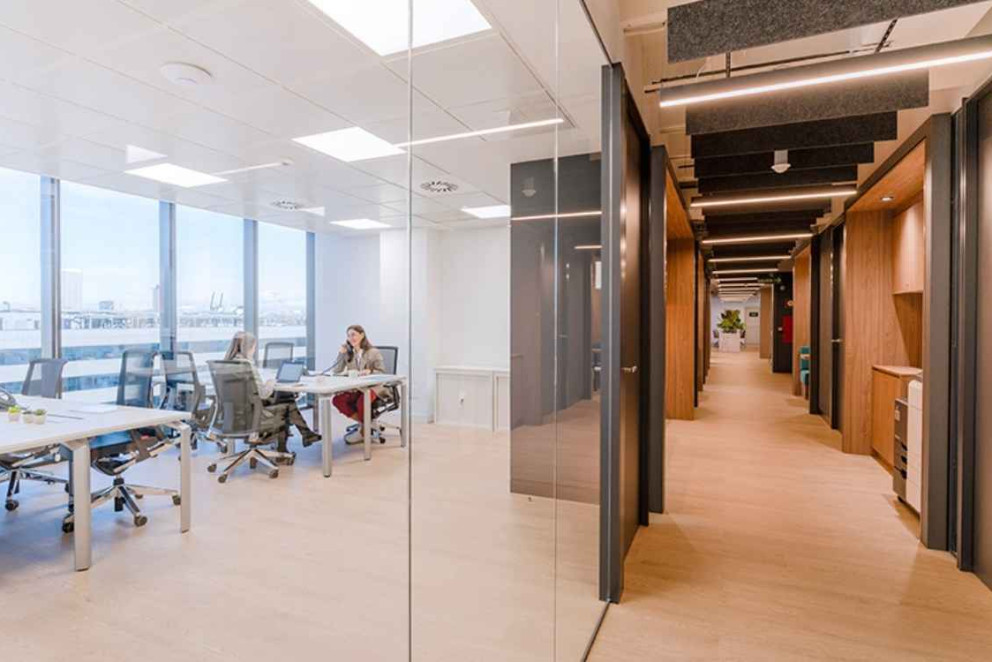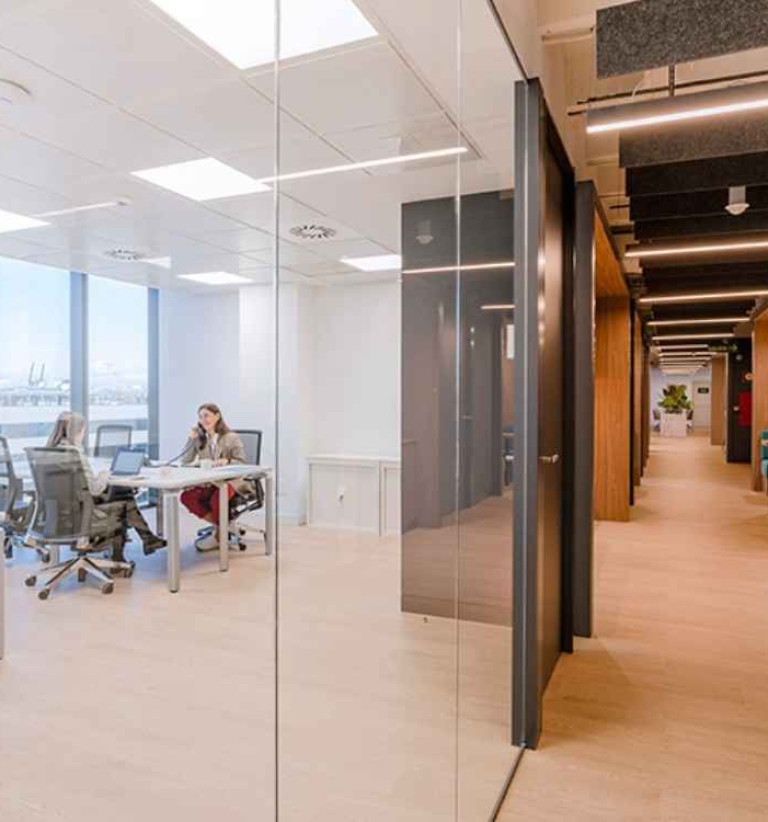Espacios que impulsan el crecimiento ✨
- Coworking means flexibility: private office spaces and shared work areas that adapt to business needs.
- A business hub goes beyond just space—it provides strategic support, mentors, training, and access to funding.
- In coworking, there are diverse and cross-functional profiles; in a hub, startups with shared growth goals coexist.
- Lexington represents corporate coworking at its finest, while Lanzadera is an example of a hub focused on scaling innovative projects.
What is a business hub?
In a business context, a hub is defined as a node of economic activity and innovation. That's why we often hear phrases like "Spain is a business hub" or "Madrid, Barcelona, and Málaga are key technology hubs."
However, in this article, we use the term business hub to describe environments where multiple companies coexist and receive support through services, mentors, networking, and strategic resources. These hubs often have physical spaces but primarily offer an ecosystem designed to drive business growth, especially for companies in the growth or consolidation phase.
Main characteristics of a hub
- Private and shared workspaces.
- Value-added services: consulting, training, networking...
- Access to funding, events, and growth opportunities.
- Professional infrastructure with brand image.
- Community of businesses with similar interests and challenges.
Example of a business hub
Lanzadera, the hub driving startups in Spain
One of the most recognized business hubs in Spain is Lanzadera, located in Valencia. Founded by Juan Roig, CEO of Mercadona, it provides startups with offices, workspaces, training, mentoring, funding, and access to a valuable network of contacts.
What is coworking?
Coworking is a shared space where freelancers, small businesses, and remote teams work in a flexible and collaborative environment. This model has gained popularity due to its low initial commitment, professional and diverse community, and adaptability to each professional's pace.
Today, coworking spaces like Lexington have evolved into a new category: corporate coworking, designed for companies seeking flexible spaces with a high-level professional image and services.
Main characteristics of coworking
- Private offices or fixed desks in shared environments.
- Access to meeting rooms by the hour or day.
- Modern, informal, and creative environments.
- Flexible contracts by day, week, or month.
- Active, multidisciplinary professional community.
- Meeting rooms, Wi-Fi, coffee, and common areas.
Example of coworking
Lexington, the coworking space for large corporations
Lexington perfectly represents the corporate coworking model. With locations in Madrid and Barcelona, it offers private offices, flexible desks, and turnkey solutions for companies of all sizes.
Many international companies in sectors such as technology or consulting have chosen Lexington to operate in Spain without having to set up an office from scratch. Discover Lexington's success stories—the next one could be yours. 😉
Differences between a business hub and a coworking space
While both offer flexible solutions, their focus is very different:
Flexibility and business focus
- Coworking: Maximum flexibility with professional services. Ideal for companies valuing agility, image, and efficiency without rigid commitments.
- Hub: Spaces designed to support growing startups with resources, mentors, and an active network.
Community and support
- Coworking: Diverse community, ideal for cross-functional networking.
- Hub: Community of startups or innovative companies with structured support.
Services and structure
- Coworking: Premium services, corporate design, easy to scale.
- Hub: Services focused on business development (training, acceleration, funding).
Commitment and growth
- Coworking: No strings attached. Ideal for working professionally with controlled costs.
- Hub: A more committed relationship with the ecosystem. Drives growth through strategic resources.
Comparison Table: Hub vs. Coworking
| Feature |
Coworking |
Business Hub |
| Type of space |
Customized shared and private spaces |
Standard shared and private spaces |
| Flexibility |
Very high |
High, but growth-oriented |
| Included services |
Call and visitor reception, room management, space customization, wellness programs. |
Mentoring, training, investment |
| Community |
Companies of all sizes |
Innovative entrepreneurs and startups |
| Commitment level |
Low |
Medium to long term |
| Ideal for |
Freelancers, SMEs, large corporations |
Startups and growing companies |
Advantages of each type
Benefits of coworking
- Professionalism with flexibility: combines the best of coworking (agility, community, design) with the corporate standards needed to operate, receive clients, and project a solid image.
- Scalability without hassle: start with a flexible desk and scale up to a custom private office in the same center, no need to move.
Benefits of a business hub
- Growth ecosystem: it’s not just about working; hubs offer mentors, acceleration programs, funding, and key contacts to grow a startup.
- Shared entrepreneurial culture: you’re surrounded by companies facing similar challenges. The community, events, and growth mindset help you move forward faster.
Which is the best option for your business?
The decision depends on your stage, goals, and work style.
- If you're looking for flexibility, a corporate image, and a top-tier professional environment, corporate coworking like Lexington is a safe bet.
- If you're launching a project and need advice, investor connections, and strategic support, joining a business hub like those in this list could give you the push you need.
📍Discover Lexington's coworking spaces in Madrid and Barcelona and find the perfect place to grow your business backed by over 40 years of experience.
Want to know more? Fill out the form and we’ll get in touch with you!







